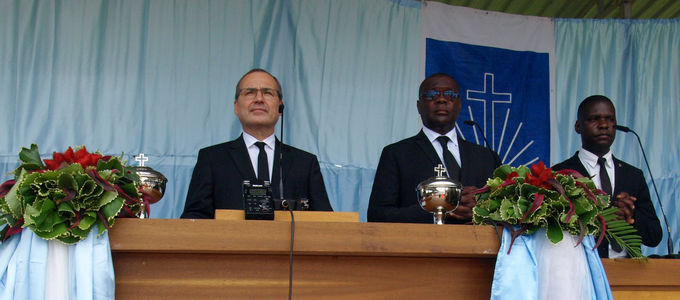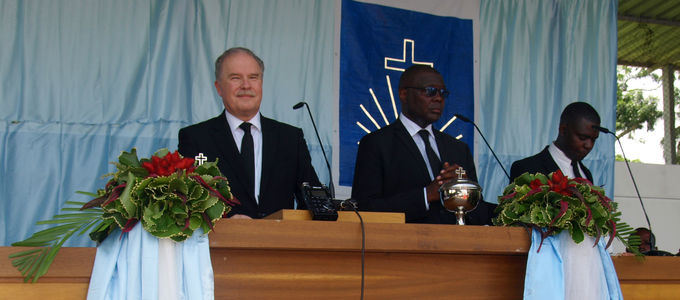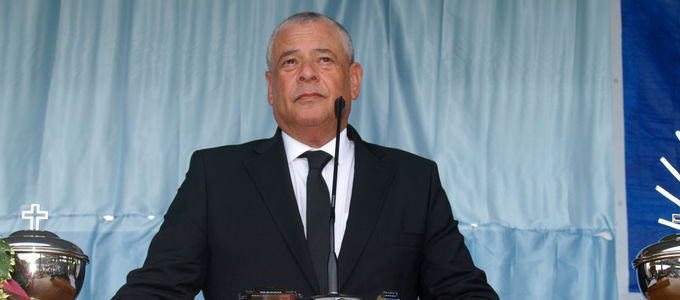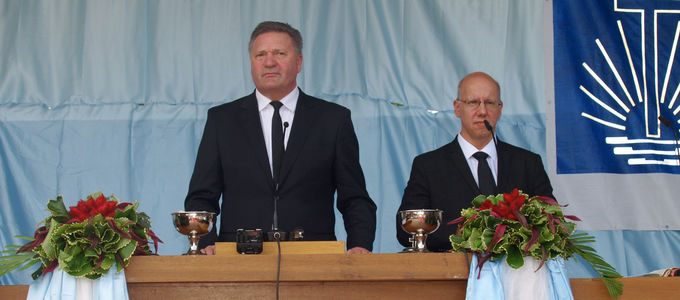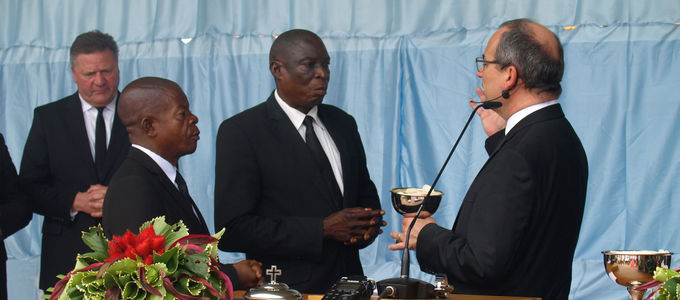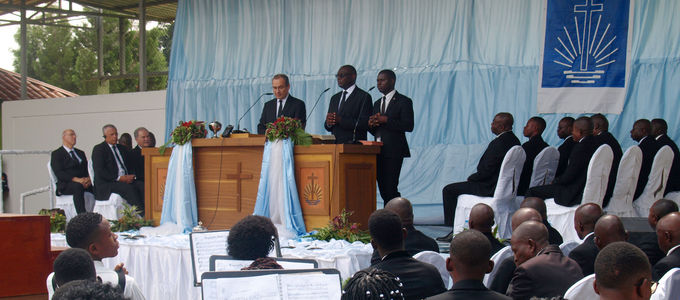Old creation—new creation: a life in conflict

There is hardly a Christian divine service that does not revolve around this theme: two kingdoms opposite one another—the classic conflict between good and evil. Chief Apostle Schneider shows a way out of this dilemma.
Sunday, 12 January 2020: The congregation in Dundo, which lies in northern Angola, breathed a sigh of relief—Chief Apostle Jean-Luc Schneider had come in order to make clear to them the deep purpose of faith in God. His message: “God liberates us from the work of the evil one through the work of Jesus Christ.” This battle between good and evil, above and below, also has a practical side, the Chief Apostle assured his listeners: “Jesus wants to liberate us from the evil one by teaching us humbleness, trust, and love for God and our neighbour.” The Christian church today can do a great deal with this. After all, the Lord not only demonstrated to us the theory, but also the practice, of good conduct in life.
A life without harmony
The Church leader’s sermon was based on a Bible passage from 2 Timothy 4: 18a, where it says: “And the Lord will deliver me from every evil work and preserve me for His heavenly kingdom.” “There has always been conflict between good and evil,” said the Chief Apostle. “By instigating human beings to fall into sin, the evil one disrupted the harmony that originally existed between man and God,” he explained. From then on, man had to live at a distance from God. Even the harmony among human beings themselves was suddenly destroyed, because Adam and Eve had been of equal standing before the fall into sin. They had complemented one another, and each of them had felt the other indispensable. “However, sin led to division, the assignment of blame, and the lust for power, as well as envy and hatred.”
Not least of all, the harmony between mankind and the creation was also disturbed—man was to have been lord over the earth, was to have protected and cultivated the creation with love and wisdom. “But sin misleads man to attach too much importance to the riches of the earth—to the point that he sometimes becomes a slave to them. Human beings have often selfishly exploited nature and even gone so far as to harm it in order to satisfy their greed.”
Liberated from the work of evil
“It is from this evil work that God seeks to liberate us,” the Chief Apostle pointed out. Instead, He wants to lead us into His kingdom, where evil does not exist. In order to achieve this,
- Jesus destroys the lies of the devil by proclaiming the truth. “His teaching reveals the true nature of God to us.”
- He has given us access to fellowship with God. “He gave His life as a sacrifice.”
- He takes away all claims of the devil against us. “He erases our sins.”
- He strengthens us so that we are able to resist the attacks of the devil. “All the devil wants to do is exploit our afflictions in order to make us distance ourselves from God.”
- He restores the unity among us by gathering us around Himself. “Only if we are one in Christ can we achieve true oneness among one another.”
Even from the evil within us
The Chief Apostle went further: “Jesus also wants to free us from our own evil works, from the evil within us, which prevents us from entering into the kingdom of God.” He offered the following examples to illustrate:
- Adam and Eve wanted to be like God and judge between good and evil on their own. “We find this same mindset with Peter, who believed he knew better than Jesus with regard to what was good for Him. Jesus liberates from such attitudes by teaching us to be humble and submissive before God.”
- “Those who are inclined to have doubts demand signs, proofs, and explanations of God. However, the Lord teaches us to trust God under all circumstances, even when we do not recognise or understand what He is doing.”
- Jesus described those who served Him for the wrong reasons as hypocrites and evildoers. “He wants to liberate us from unrighteousness by allowing us to grow in love for God. Those who love God with a pure heart will serve Him without calculation.”
- He also desires to liberate us from egoism, the source of countless evils, “by requiring us to love our neighbour”. This is concretely demonstrated when we observe the Golden Rule: “And just as you want men to do to you, you also do to them likewise” (Luke 6: 31).
- “Those who love God do not attach too much importance to earthly goods or make them into idols. Our love for God allows us to appreciate and preserve the work of the Creator.”
A glance into the future
In conclusion, the Chief Apostle added another forward-looking thought to his sermon: “Love for our neighbour prompts us to distribute the earth’s resources fairly between each individual and the generations. God is preparing us to enter into His glory as firstlings. Evil will no longer exist there. He is tirelessly pursuing His work of redemption, and will continue to do so all the way to the Last Judgement. “Those who allow themselves to be saved by Jesus Christ will then enter into the new creation, where they will live in perfect harmony with God, among one another, and with the creation.”








